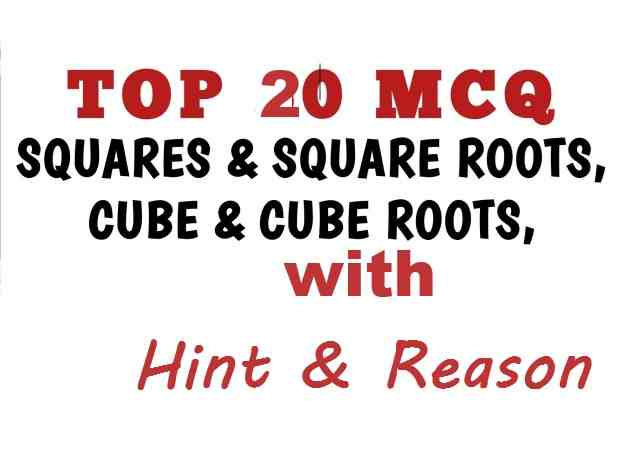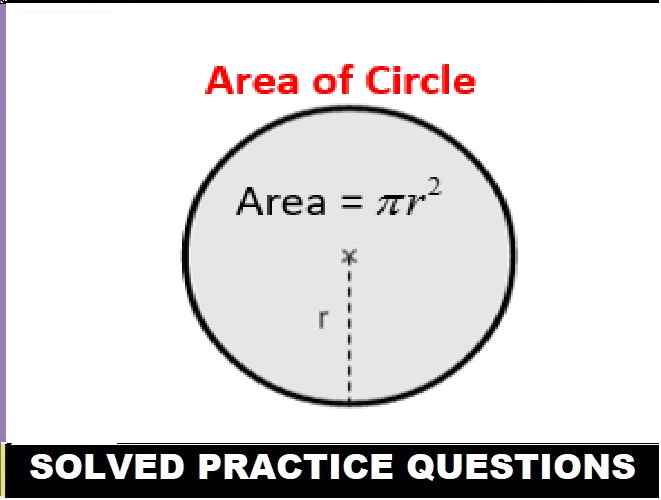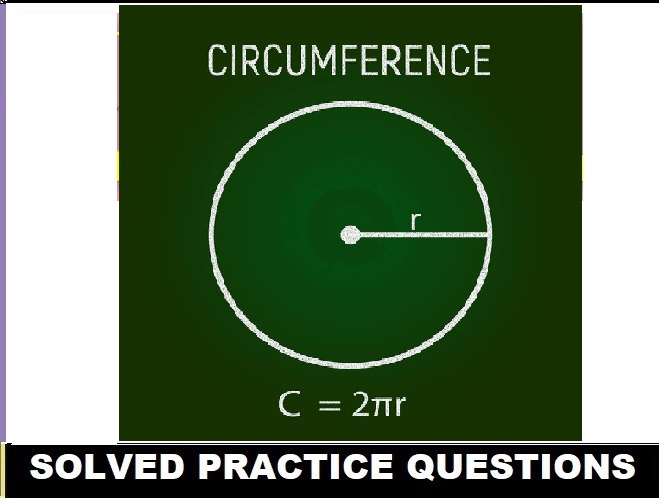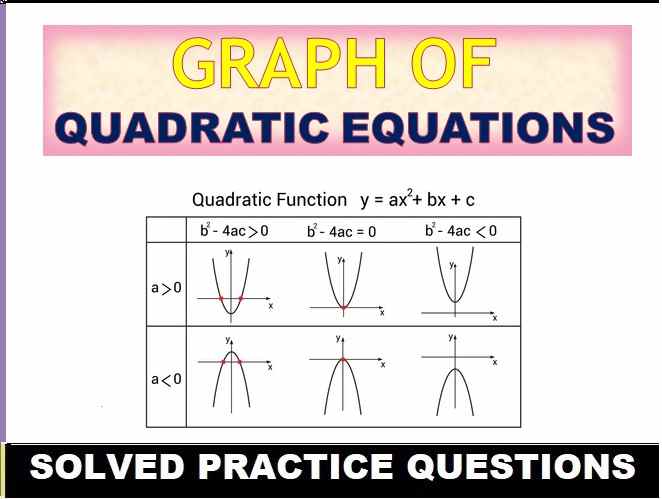Squares and Cube Roots Class 8 RS Aggarwal Exe-3F MCQs Goyal Brothers Prakashan ICSE Foundation Maths Solutions Ch-3. We provide step by step Solutions of cisce prescribe publications to develop skill and confidence. Visit official Website CISCE for detail information about ICSE Board Class-8 Mathematics.

Squares and Cube Roots Class 8 RS Aggarwal Exe-3F MCQs Goyal Brothers ICSE Maths Solutions
| Board | ICSE |
| Publications | Goyal Brothers Prakshan |
| Subject | Maths |
| Class | 8th |
| writer | RS Aggarwal |
| Book Name | Foundation |
| Ch-3 | Squares and Squire Roots, Cubes and Cube Roots |
| Exe-3F | MCQs on Squares and Cube Roots |
| Edition | 2024-2025 |
Squares and Squire Roots, Cubes and Cube Roots
Squares and Cube Roots Class 8 RS Aggarwal Exe-3F MCQs Goyal Brothers Prakashan ICSE Foundation Maths Solutions Ch-3
Page- 54,55
Exercise- 3F
MCQs on Squares and Squire Roots, Cubes and Cube Roots
Multiple Choice Questions :
Que-1: How many perfect squares lie between 120 and 300 ?
(a) 5 (b) 6 (c) 7 (d)8
Solution- (c) 7
Reason : (11)2 = 121 (Greater than 120 but less than 300)
(17)2 = 289 (Greater than 120 but less than 300)
(18)2 = 324 (Greater than 120 but not less than 300)
∴ We have 7 (11 to 17) numbers between 120 and 300 which are perfect squares.
Que-2: √[41 – √{21 + √(19 – √9)}] = ?
(a) 3 (b) 5 (c) 6 (d) 6.4
Solution- (c) 6
Reason :√41−√21+√19−3
= √41−√21+√16
= √41−√21+4
= √41−√25
= √41−5
= √36 = 6.
Que-3: The value of √0.01 + √0.81 + √1.44 + √0.0009 is
(a) 2.03 (b) 2.1 (c) 2.11 (d) 2.23
Solution- (d) 2.23
Reason: √0.01+√0.81+√1.44+√0.0009
= √1/100+√81/100+√144/100+√9/10000
= √1/√100+√81/√100+√144/√100+√9/√10000
= 1/10 + 9/10 + 12/10 + 3/100
= 0.1 + 0.9 + 1.2 + 0.03 = 2.23
Que-4: If 52/x = √(169/289), then the value of is
(a) 52 (b) 58 (c) 62 (d) 68
Solution- (d) 68
Reason : 52/x = √169/289
⇒ 52/x = √13²/17²
⇒ 52/x = 13/17
⇒ 13x = 52×17 [cross multiplication]
⇒ x = (52×17)/13
⇒ x = 68
Que-5: ? ÷ √0.25 = 25
(a) 12.5 (b) 25 (c) 50 (d) 125
Solution- (a) 12.5
Reason : let’s solve √0.25 first
√0.25 = 0.5
let the no. be x
x/0.5 = 25
x = 25 x 0.5
x = 12.5
Que-6: For what value of * the statement (*/15) (*/135) = 1 is true ?
(a) 15 (b) 25 (c) 35 (d) 45
Solution- (d) 45
Reason : Let the missing number be x.
Then, x² = 15×135
⇔ x = √(15×135)
= √(15²×3²)
= 15×3 = 45.
Que-7: What percentage of the numbers from 1 to 50 have squares that end in the digit 1 ?
(a) 10 (b) 5 (c) 11 (d) 20
Solution- (d) 20
Reason : The numbers from 1 to 50 that have their squares ending in digit 1 are 1, 9, 11, 19, 21, 29, 31, 39, 41, 49, i.e. 10 in numbers
∴ Required percentage = 10/50 × 100 = 20%
Que-8: Which of the following cannot be the unit digit of a perfect square number ?
(a) 1 (b) 6 (c) 8 (d) 9
Solution- (c) 8
Reason :Perfect square → Unit place digit
1² = 1
2² = 4
3² = 9
4² = 16
5² = 25
6² = 36
7² = 49
8² = 64
9² = 81
10² = 100
We can see number which can comes to unit place of perfect squares are 1,4,5,6,9 and 0.
∴ The numbers which can not come to the unit place of perfect square are 8.
Que-9: √288/√128 = ?
(a) √3/2 (b) 3/√2 (c) 3/2 (d) 1.49
Solution- (c) 3/2
Reason : √288/√128
= √(288/128)
= √9/4 = 3/2
Que-10: √72 x √98 = ?
(a) 42 (b) 64 (c) 74 (d) 84
Solution- (d) 84
Reason : √72 x √98 = √(2 x 2 x 2 x 3 x 3) x √(2 x 7 x 7)
= √(2 x 2 x 2 x 2 x 3 x 3 x 7 x 7)
= 2 × 2 × 3 × 7
= 84
Que-11: The least number by which 294 must be multiplied to make it a perfect square, is
(a) 2 (b) 3 (c) 6 (d) 24
Solution- (c) 6
Reason : 294 = 7 x 7 x 2 x 3.
To get a perfect square, it has to be multiplied by 2 x 3 i.e., 6.
∴ Required number = 6.
Que-12: The least number by which 1470 must be divided to get a number which is a perfect square, is
(a) 5 (b) 6 (c) 15 (d) 30
Solution- (d) 30
Reason : 1470 = 7 × 7 × 5 × 6.
To get a perfect square, it must be divided by 5 × 6, i.e., 30.
Que-13: What is the least number to be added to 7700 to make it a perfect square ?
(a) 44 (b) 77 (c) 98 (d) 131
Solution- (a) 44
Reason : √7700 ≈ 87.7496
Rounding up to the next integer gives us 88. So, the next perfect square after 7700 is
88² = 7744.
Now, to find the least number to be added to 7700 to make it a perfect square, we subtract 7700 from 7744:
7744 − 7700 = 44.
So, the least number to be added to 7700 to make it a perfect square is 44.
Que-14: √110.25 x √0.01 ÷ √0.0025 – √420.25 equals
(a) 0.50 (b) 0.64 (c) 0.73 (d) 0.75
Solution- (a) 0.50
Reason: √110.25 : This is the square root of 110.25, which is 10.5.
√0.01 : This is the square root of 0.01, which is 0.1.
√0.0025 : This is the square root of 0.0025, which is 0.05.
√420.25 : This is the square root of 420.25, which is 20.5.
Now, let’s substitute these values into the expression:
√110.25 × √0.01 ÷ √0.0025 − √420.25.
= 10.5 × 0.1 ÷ 0.05 − 20.5.
= 1.05 ÷ 0.05 − 20.5
= 21 − 20.5
= 0.5.
Que-15: The greatest four digit perfect square number is
(a) 9000 (b) 9801 (c) 9900 (d) 9981
Solution- (b) 9801
Reason: The largest four-digit number is 9999.
The square root of 9999 is approximately 99.995, which means the largest perfect square less than 9999 is 99² = 9801.
So, the greatest four-digit perfect square number is 9801.
Que-16: A gardener plants 17956 trees in such a way that there are as many rows as there are trees in a row. The number of trees in a row is
(a) 134 (b) 136 (c) 144 (d) 154
Solution- (a) 134
Reason: Let the number of rows = x
Number of columns = x
Total trees = 17956
x × x = 17956
x² = 17956
x = √17956
x = √(2×2×67×67)
x = 2×67
x = 134
Therefore, the number of trees on a rows =134.
Que-17: ∛4*(12/125) = ?
(a) 1*(2/5) (b) 1*(3/5) (c) 1*(4/5) (d) 2*(2/5)
Solution- (b) 1*(3/5)
Reason: ∛4*(12/125) = ∛512/125 = ∛512/∛125
⇒ 512 = 2³ × 2³ × 2³
⇒ ∛512 = 2×2×2 = 8
⇒ 125 = 5³
⇒ ∛125 = 5
∴ ∛512/∛125 = 8/5 = 1*(3/5)
Que-18: By what least number must 21600 be multiplied so as to make it a perfect cube ?
(a) 6 (b) 10 (c) 20 (d) 30
Solution- (b) 10
Reason: 21600 can be factorized as 6×6×6×10×10
To make it perfect cube, it must be multiplied by 10
Que-19: What is the smallest number by which 3600 be divided to make it a perfect cube ?
(a) 9 (b) 50 (c) 300 (d) 450
Solution- (d) 450
Reason: 3600 can be written as 2^4 3^2 5^2
∴ To make it perfect cube divide it by 2 × 3²×5²
⇒ 450
— : End of Squares and Cube Roots Class 8 RS Aggarwal Exe-3F MCQs Goyal Brothers Prakashan ICSE Foundation Maths Solutions :–
Return to- ICSE Class -8 RS Aggarwal Goyal Brothers Math Solutions
Thanks
Please share with yours friends if you find it helpful.


